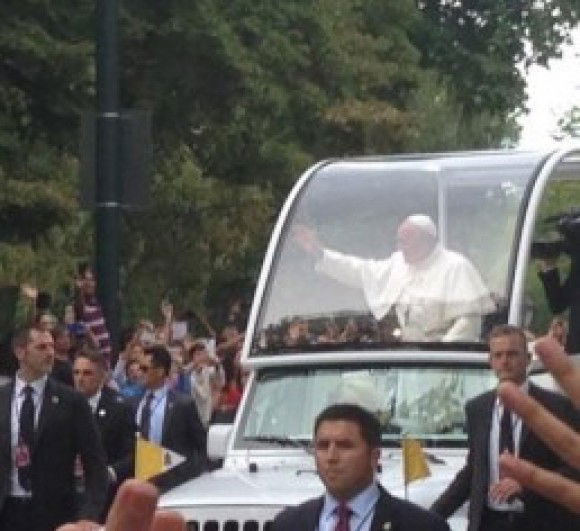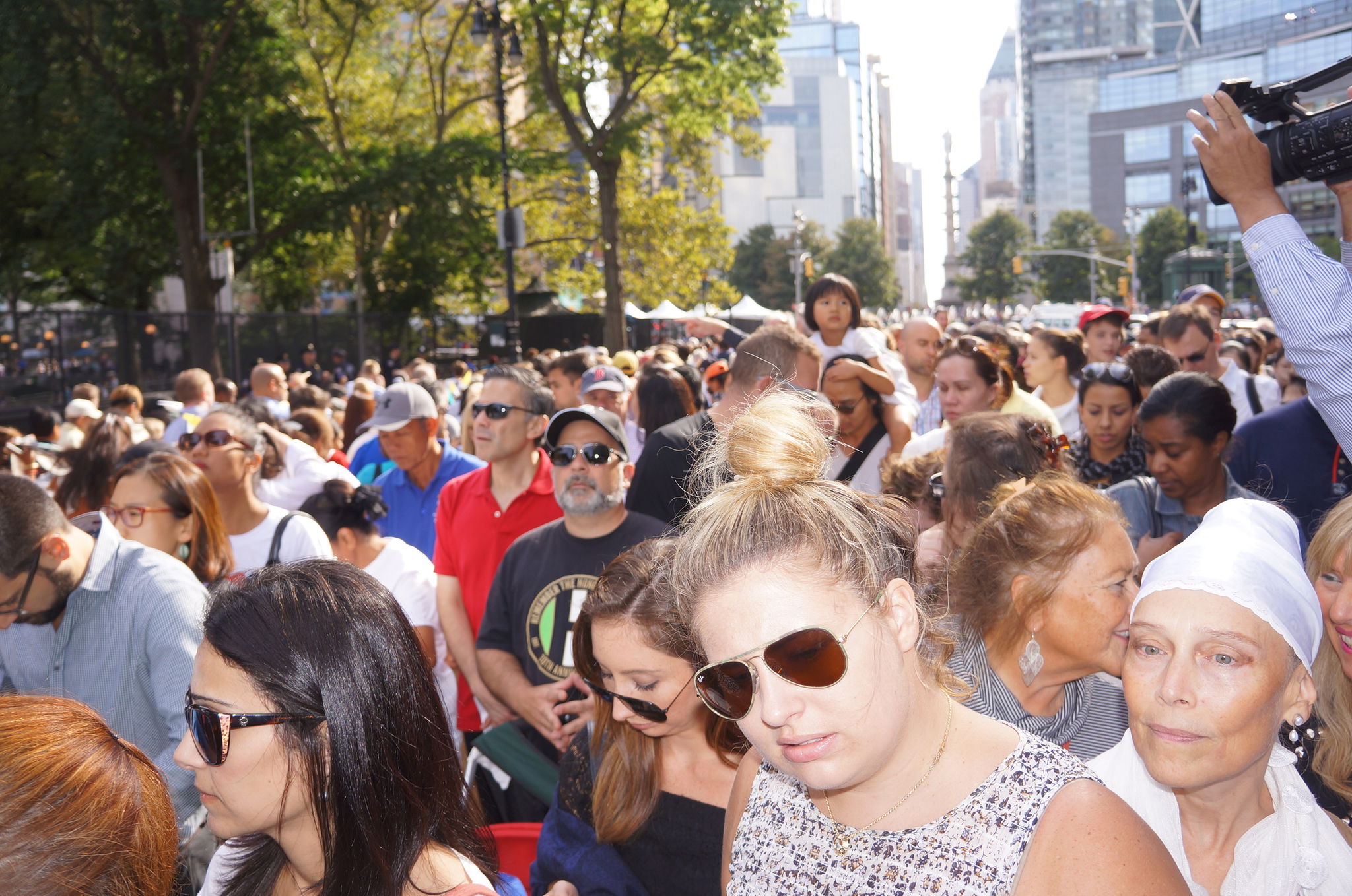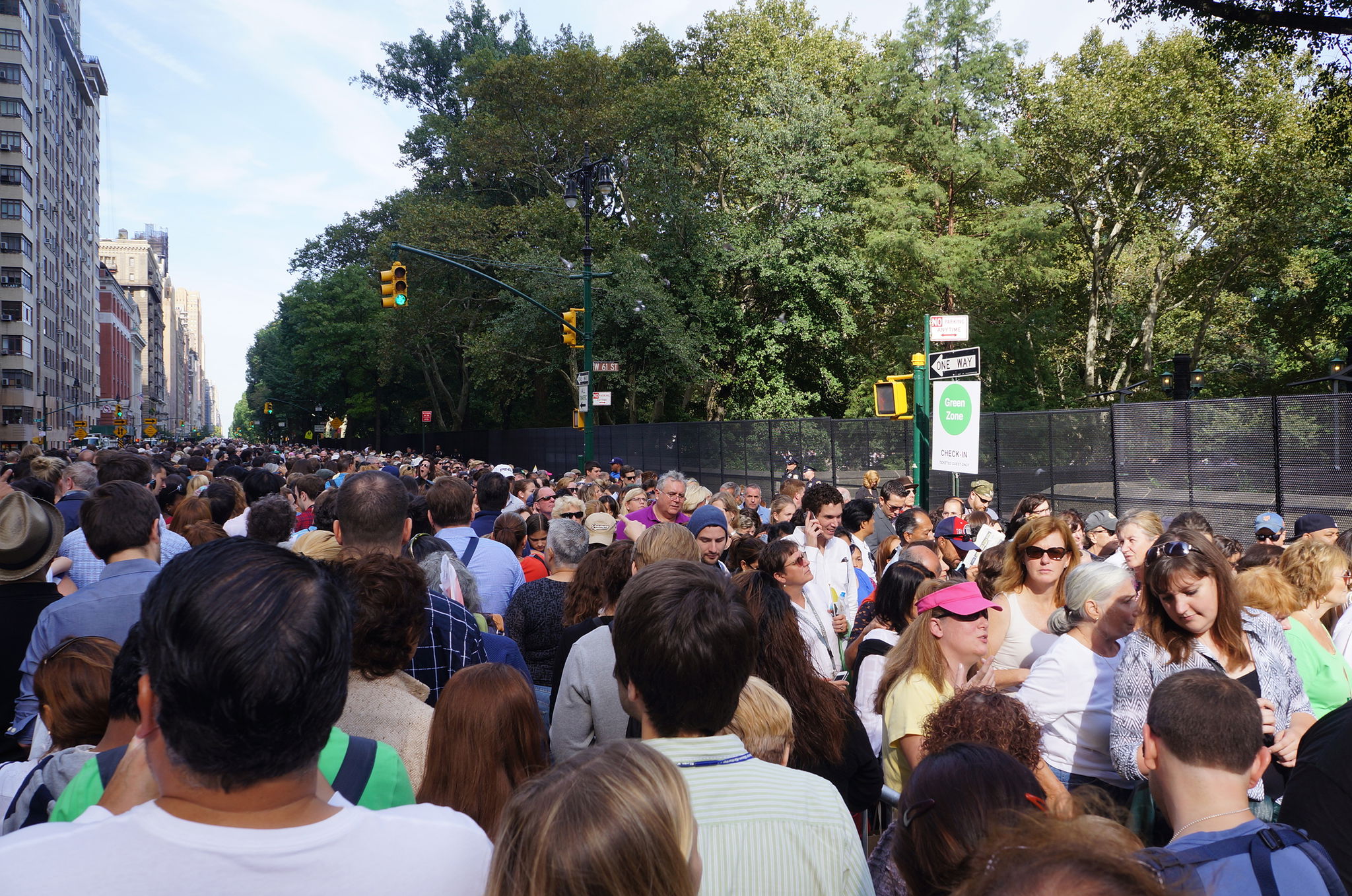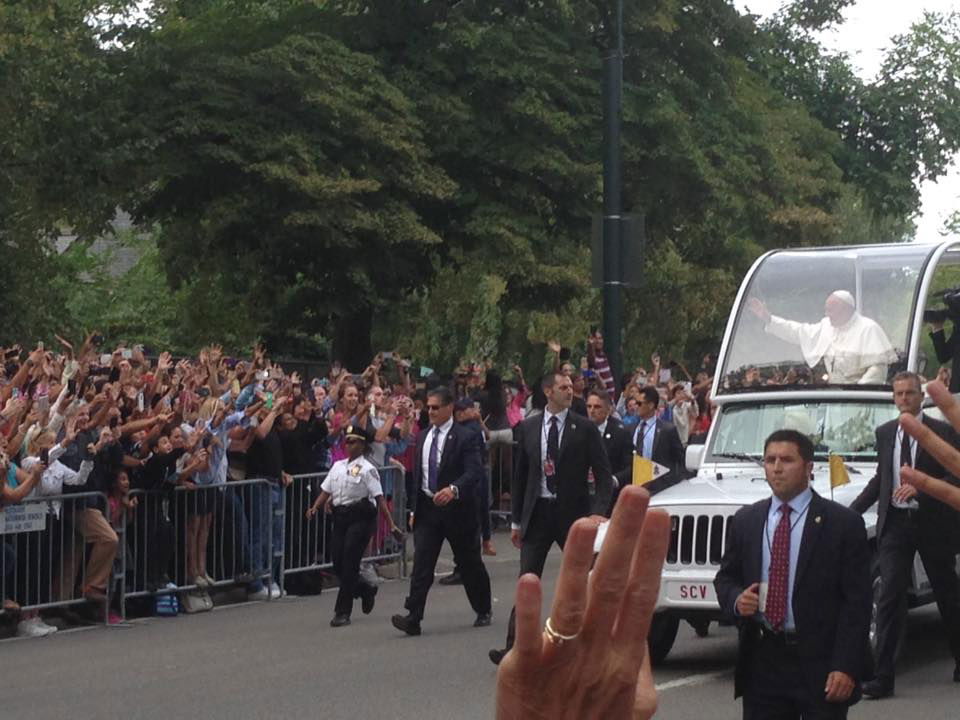America
Pope\\\'s speeches at Madison Square Garden, 9/11 Museum, UN General Assembly

Ground Zero Memorial, Inter-religious meeting
I feel many different emotions standing here at Ground Zero, where thousands of lives were taken in a senseless act of destruction. Here grief is palpable.
The water we see flowing towards that empty pit reminds us of all those lives which fell prey to those who think that destruction, tearing down, is the only way to settle conflicts. It is the silent cry of those who were victims of a mindset which knows only violence, hatred and revenge.
A mindset which can only cause pain, suffering, destruction and tears. The flowing water is also a symbol of our tears. Tears at so much devastation and ruin, past and present. This is a place where we shed tears, we weep out of a sense of helplessness in the face of injustice, murder, and the failure to settle conflicts through dialogue. Here we mourn the wrongful and senseless loss of innocent lives because of the inability to find solutions which respect the common good.
This flowing water reminds us of yesterday’s tears, but also of all the tears still being shed today. A few moments ago I met some of the families of the fallen first responders. Meeting them made me see once again how acts of destruction are never impersonal, abstract or merely material. They always have a face, a concrete story, names. In those family members, we see the face of pain, a pain which still touches us and cries out to heaven.
At the same time, those family members showed me the other face of this attack, the other face of their grief: the power of love and remembrance. A remembrance that does not leave us empty and withdrawn. The name of so many loved ones are written around the towers’ footprints. We can see them, we can touch them, and we can never forget them. Here, amid pain and grief, we also have a palpable sense of the heroic goodness which people are capable of, those hidden reserves of strength from which we can draw. In the depths of pain and suffering, you also witnessed the heights of generosity and service. Hands reached out, lives were given. In a metropolis which might seem impersonal, faceless, lonely, you demonstrated the powerful solidarity born of mutual support, love and self-sacrifice.
No one thought about race, nationality, neighborhoods, religion or politics. It was all about solidarity, meeting immediate needs, brotherhood. It was about being brothers and sisters. New York City firemen walked into the crumbling towers, with no concern for their own wellbeing. Many succumbed; their sacrifice enabled great numbers to be saved. This place of death became a place of life too, a place of saved lives, a hymn to the triumph of life over the prophets of destruction and death, to goodness over evil, to reconciliation and unity over hatred and division.
It is a source of great hope that in this place of sorrow and remembrance I can join with leaders representing the many religious traditions which enrich the life of this great city. I trust that our presence together will be a powerful sign of our shared desire to be a force for reconciliation, peace and justice in this community and throughout the world. For all our differences and disagreements, we can live in a world of peace. In opposing every attempt to create a rigid uniformity, we can and must build unity on the basis of our diversity of languages, cultures and religions, and lift our voices against everything which HOLY SEE PRESS OFFICE 15/2 would stand in the way of such unity. Together we are called to say “no†to every attempt to impose uniformity and “yes†to a diversity accepted and reconciled.
This can only happen if we uproot from our hearts all feelings of hatred, vengeance and resentment. We know that that is only possible as a gift from heaven. Here, in this place of remembrance, I would ask everyone together, each in his or her own way, to spend a moment in silence and prayer. Let us implore from on high the gift of commitment to the cause of peace.
Peace in our homes, our families, our schools and our communities. Peace in all those places where war never seems to end. Peace for those faces which have known nothing but pain. Peace throughout this world which God has given us as the home of all and a home for all. Simply PEACE.
In this way, the lives of our dear ones will not be lives which will one day be forgotten. Instead, they will be present whenever we strive to be prophets not of tearing down but of building up, prophets of reconciliation, prophets of peace.
Madison Square Garden Holy Mass
We are in Madison Square Garden, a place synonymous with this city. This is the site of important athletic, artistic and musical events attracting people not only from this city, but from the whole world. In this place, which represents both the variety and the common interests of so many different people, we have listened to the words: “The people who walked in darkness have seen a great light†(Is 9:1). The people who walked – caught up in their activities and routines, amid their successes and failures, their worries and expectations – have seen a great light.
The people who walked – with all their joys and hopes, their disappointments and regrets – have seen a great light. In every age, the People of God are called to contemplate this light. A light for the nations, as the elderly Simeon joyfully expressed it. A light meant to shine on every corner of this city, on our fellow citizens, on every part of our lives. “The people who walked in darkness have seen a great lightâ€. One special quality of God’s people is their ability to see, to contemplate, even in “moments of darknessâ€, the light which Christ brings.
God’s faithful people can see, discern and contemplate his living presence in the midst of life, in the midst of the city. Together with the prophet Isaiah, we can say: The people who walk, breathe and live in the midst of smog, have seen a great light, have experienced a breath of fresh air. Living in a big city is not always easy. A multicultural context presents many complex challenges. Yet big cities are a reminder of the hidden riches present in our world: in the diversity of its cultures, traditions and historical experiences. In the variety of its languages, costumes and cuisine. Big cities bring together all the different ways which we human beings have discovered to express the meaning of life, wherever we may be.
But big cities also conceal the faces of all those people who don’t appear to belong, or are secondclass citizens. In big cities, beneath the roar of traffic, beneath “the rapid pace of changeâ€, so many faces pass by unnoticed because they have no “right†to be there, no right to be part of the city. They are the foreigners, the children who go without schooling, those deprived of medical insurance, the homeless, the forgotten elderly. These people stand at the edges of our great avenues, in our streets, in deafening anonymity.
They become part of an urban landscape which is more and more taken for granted, in our eyes, and especially in our hearts. Knowing that Jesus still walks our streets, that he is part of the lives of his people, that he is involved with us in one vast history of salvation, fills us with hope. A hope which liberates us from the forces pushing us to isolation and lack of concern for the lives of others, for the life of our city. A hope which frees us from empty “connectionsâ€, from abstract analyses, or sensationalist routines. A hope which is unafraid of involvement, which acts as a leaven wherever we happen to live and work. A hope which makes us see, even in the midst of smog, the presence of God as he continues to walk the streets of our city.
What is it like, this light travelling through our streets? How do we encounter God, who lives with us amid the smog of our cities? How do we encounter Jesus, alive and at work in the daily life of our multicultural cities? The prophet Isaiah can guide us in this process of “learning to seeâ€. He presents Jesus to us as “Wonderful Counselor, the Mighty God, the Everlasting Father, the Prince of Peaceâ€.
In this way, he introduces us to the life of the Son, so that his life can be our life. Wonderful Counselor. The Gospels tell us how many people came up to Jesus to ask: “Master, what must we do?†The first thing that Jesus does in response is to propose, to encourage, to motivate. He keeps telling his disciples to go, to go out. He urges them to go out and meet others where they really are, not where we think they should be. Go out, again and again, go out without fear, without hesitation. Go out and proclaim this joy which is for all the people.
The Mighty God. In Jesus, God himself became Emmanuel, God-with-us, the God who walks alongside us, who gets involved in our lives, in our homes, in the midst of our “pots and pansâ€, as Saint Teresa of Jesus liked to say. The Everlasting Father. No one or anything can separate us from his Love. Go out and proclaim, go out and show that God is in your midst as a merciful Father who himself goes out, morning and evening, to see if his son has returned home and, as soon as he sees him coming, runs out to embrace him. An embrace which wants to take up, purify and elevate the dignity of his children. A Father who, in his embrace, is “glad tidings to the poor, healing to the afflicted, liberty to captives, comfort to those who mourn†(Is 61:1-2). Prince of Peace. Go out to others and share the good news that God, our Father, walks at our side. He frees us from anonymity, from a life of emptiness and selfishness, and brings us to the school of encounter. He removes us from the fray of competition and self-absorption, and he opens before us the path of peace.
That peace which is born of accepting others, that peace which fills our hearts whenever we look upon those in need as our brothers and sisters. God is living in our cities. The Church is living in our cities, and she wants to be like yeast in the dough. She wants to relate to everyone, to stand at everyone’s side, as she proclaims the marvels of the Wonderful Counselor, the Mighty God, the Eternal Father, the Prince of Peace. “The people who walked in darkness have seen a great lightâ€. And we ourselves are witnesses of that light.
Speech at UN General Assembly
http://www.usccb.org/about/leadership/holy-see/francis/papal-visit-2015/media-resources/upload/14B-ENGLISH-UNGA-EMBARGOED.pdf
I feel many different emotions standing here at Ground Zero, where thousands of lives were taken in a senseless act of destruction. Here grief is palpable.
The water we see flowing towards that empty pit reminds us of all those lives which fell prey to those who think that destruction, tearing down, is the only way to settle conflicts. It is the silent cry of those who were victims of a mindset which knows only violence, hatred and revenge.
A mindset which can only cause pain, suffering, destruction and tears. The flowing water is also a symbol of our tears. Tears at so much devastation and ruin, past and present. This is a place where we shed tears, we weep out of a sense of helplessness in the face of injustice, murder, and the failure to settle conflicts through dialogue. Here we mourn the wrongful and senseless loss of innocent lives because of the inability to find solutions which respect the common good.
This flowing water reminds us of yesterday’s tears, but also of all the tears still being shed today. A few moments ago I met some of the families of the fallen first responders. Meeting them made me see once again how acts of destruction are never impersonal, abstract or merely material. They always have a face, a concrete story, names. In those family members, we see the face of pain, a pain which still touches us and cries out to heaven.
At the same time, those family members showed me the other face of this attack, the other face of their grief: the power of love and remembrance. A remembrance that does not leave us empty and withdrawn. The name of so many loved ones are written around the towers’ footprints. We can see them, we can touch them, and we can never forget them. Here, amid pain and grief, we also have a palpable sense of the heroic goodness which people are capable of, those hidden reserves of strength from which we can draw. In the depths of pain and suffering, you also witnessed the heights of generosity and service. Hands reached out, lives were given. In a metropolis which might seem impersonal, faceless, lonely, you demonstrated the powerful solidarity born of mutual support, love and self-sacrifice.
No one thought about race, nationality, neighborhoods, religion or politics. It was all about solidarity, meeting immediate needs, brotherhood. It was about being brothers and sisters. New York City firemen walked into the crumbling towers, with no concern for their own wellbeing. Many succumbed; their sacrifice enabled great numbers to be saved. This place of death became a place of life too, a place of saved lives, a hymn to the triumph of life over the prophets of destruction and death, to goodness over evil, to reconciliation and unity over hatred and division.
It is a source of great hope that in this place of sorrow and remembrance I can join with leaders representing the many religious traditions which enrich the life of this great city. I trust that our presence together will be a powerful sign of our shared desire to be a force for reconciliation, peace and justice in this community and throughout the world. For all our differences and disagreements, we can live in a world of peace. In opposing every attempt to create a rigid uniformity, we can and must build unity on the basis of our diversity of languages, cultures and religions, and lift our voices against everything which HOLY SEE PRESS OFFICE 15/2 would stand in the way of such unity. Together we are called to say “no†to every attempt to impose uniformity and “yes†to a diversity accepted and reconciled.
This can only happen if we uproot from our hearts all feelings of hatred, vengeance and resentment. We know that that is only possible as a gift from heaven. Here, in this place of remembrance, I would ask everyone together, each in his or her own way, to spend a moment in silence and prayer. Let us implore from on high the gift of commitment to the cause of peace.
Peace in our homes, our families, our schools and our communities. Peace in all those places where war never seems to end. Peace for those faces which have known nothing but pain. Peace throughout this world which God has given us as the home of all and a home for all. Simply PEACE.
In this way, the lives of our dear ones will not be lives which will one day be forgotten. Instead, they will be present whenever we strive to be prophets not of tearing down but of building up, prophets of reconciliation, prophets of peace.
Madison Square Garden Holy Mass
We are in Madison Square Garden, a place synonymous with this city. This is the site of important athletic, artistic and musical events attracting people not only from this city, but from the whole world. In this place, which represents both the variety and the common interests of so many different people, we have listened to the words: “The people who walked in darkness have seen a great light†(Is 9:1). The people who walked – caught up in their activities and routines, amid their successes and failures, their worries and expectations – have seen a great light.
The people who walked – with all their joys and hopes, their disappointments and regrets – have seen a great light. In every age, the People of God are called to contemplate this light. A light for the nations, as the elderly Simeon joyfully expressed it. A light meant to shine on every corner of this city, on our fellow citizens, on every part of our lives. “The people who walked in darkness have seen a great lightâ€. One special quality of God’s people is their ability to see, to contemplate, even in “moments of darknessâ€, the light which Christ brings.
God’s faithful people can see, discern and contemplate his living presence in the midst of life, in the midst of the city. Together with the prophet Isaiah, we can say: The people who walk, breathe and live in the midst of smog, have seen a great light, have experienced a breath of fresh air. Living in a big city is not always easy. A multicultural context presents many complex challenges. Yet big cities are a reminder of the hidden riches present in our world: in the diversity of its cultures, traditions and historical experiences. In the variety of its languages, costumes and cuisine. Big cities bring together all the different ways which we human beings have discovered to express the meaning of life, wherever we may be.
But big cities also conceal the faces of all those people who don’t appear to belong, or are secondclass citizens. In big cities, beneath the roar of traffic, beneath “the rapid pace of changeâ€, so many faces pass by unnoticed because they have no “right†to be there, no right to be part of the city. They are the foreigners, the children who go without schooling, those deprived of medical insurance, the homeless, the forgotten elderly. These people stand at the edges of our great avenues, in our streets, in deafening anonymity.
They become part of an urban landscape which is more and more taken for granted, in our eyes, and especially in our hearts. Knowing that Jesus still walks our streets, that he is part of the lives of his people, that he is involved with us in one vast history of salvation, fills us with hope. A hope which liberates us from the forces pushing us to isolation and lack of concern for the lives of others, for the life of our city. A hope which frees us from empty “connectionsâ€, from abstract analyses, or sensationalist routines. A hope which is unafraid of involvement, which acts as a leaven wherever we happen to live and work. A hope which makes us see, even in the midst of smog, the presence of God as he continues to walk the streets of our city.
What is it like, this light travelling through our streets? How do we encounter God, who lives with us amid the smog of our cities? How do we encounter Jesus, alive and at work in the daily life of our multicultural cities? The prophet Isaiah can guide us in this process of “learning to seeâ€. He presents Jesus to us as “Wonderful Counselor, the Mighty God, the Everlasting Father, the Prince of Peaceâ€.
In this way, he introduces us to the life of the Son, so that his life can be our life. Wonderful Counselor. The Gospels tell us how many people came up to Jesus to ask: “Master, what must we do?†The first thing that Jesus does in response is to propose, to encourage, to motivate. He keeps telling his disciples to go, to go out. He urges them to go out and meet others where they really are, not where we think they should be. Go out, again and again, go out without fear, without hesitation. Go out and proclaim this joy which is for all the people.
The Mighty God. In Jesus, God himself became Emmanuel, God-with-us, the God who walks alongside us, who gets involved in our lives, in our homes, in the midst of our “pots and pansâ€, as Saint Teresa of Jesus liked to say. The Everlasting Father. No one or anything can separate us from his Love. Go out and proclaim, go out and show that God is in your midst as a merciful Father who himself goes out, morning and evening, to see if his son has returned home and, as soon as he sees him coming, runs out to embrace him. An embrace which wants to take up, purify and elevate the dignity of his children. A Father who, in his embrace, is “glad tidings to the poor, healing to the afflicted, liberty to captives, comfort to those who mourn†(Is 61:1-2). Prince of Peace. Go out to others and share the good news that God, our Father, walks at our side. He frees us from anonymity, from a life of emptiness and selfishness, and brings us to the school of encounter. He removes us from the fray of competition and self-absorption, and he opens before us the path of peace.
That peace which is born of accepting others, that peace which fills our hearts whenever we look upon those in need as our brothers and sisters. God is living in our cities. The Church is living in our cities, and she wants to be like yeast in the dough. She wants to relate to everyone, to stand at everyone’s side, as she proclaims the marvels of the Wonderful Counselor, the Mighty God, the Eternal Father, the Prince of Peace. “The people who walked in darkness have seen a great lightâ€. And we ourselves are witnesses of that light.
Speech at UN General Assembly
http://www.usccb.org/about/leadership/holy-see/francis/papal-visit-2015/media-resources/upload/14B-ENGLISH-UNGA-EMBARGOED.pdf




